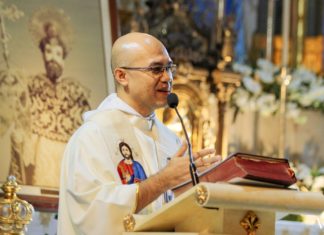FORMER Covid-19 National Task Force adviser Dr. Anthony Leachon stressed the importance of ramping up tests and immediate contact tracing as Covid-19 cases continued to surge.
This would be the only way to reopen the economy which has been gutted by prolonged lockdowns, said Leachon, who was removed from the task force in June for speaking out against the “lack of urgency” of the Covid-19 response led by Health Secretary Francisco Duque III.
Leachon, a cardiologist and a UST Medicine alumnus, expressed concern over the small number of contact tracers in the country.
“The importance of contact tracing is that you’ll be able to reduce the viral transmission because you’ll be able to track [Covid-19 cases] and isolate them. If there’s no contact tracing, all of these exposed individuals will be mixed with the general population,” he told the Varsitarian.
Leachon said the ideal contact tracer-to-population ratio was 1:800 based on World Health Organization standards.
The country will need some P30 billion in funding to meet the ideal ratio, he said.
The Department of the Interior and Local Government (DILG) leads contact-tracing efforts, as mandated by Resolution No. 25 of the Inter-Agency Task Force on the Management Emerging Infectious Diseases.
Interior Secretary Eduardo Año said that as of July 20, the country had a total of 69,098 contact tracers. The DILG is looking for 50,000 more contact tracers.
The ratio stands at one contact tracer per 1,563 Filipinos. The government needs 135,000 contact tracers to meet the 1:800 recommended ratio.
Competent leadership needed
Leachon credited the success of countries leading the Covid-19 fight, such as New Zealand and Vietnam, to competent leadership and for prioritizing tests. He again hit the government’s lack of “sense of urgency” in handling the pandemic.
He criticized Duque, a fellow UST Medicine alumnus, for refusing to listen to the public and the people working around him.
“What I’m trying to say is that, since the president is in full trust and confidence in him (Duque) and his job is well-secured, perhaps he should listen to the public in terms of inefficiencies that are being cited by the different sectors,” Leachon said.
Leachon also said the national action plan vs Covid-19 should be reviewed.
“If certain people can’t handle the responsibility then we reshuffle or change people if they are not effective. And then input resources on the things that would matter most,” Leachon said.
Duque and the Department of Health are facing an investigation by the Office of the Ombudsman over the Covid-19 response.
The health department is under scrutiny for the alleged overpriced procurement of medical and personal protective equipment, delayed compensation to healthcare workers, the deaths of medical frontliners and lapses in the distribution of financial assistance to their families.
Dr. Benjamin Quito, a cardiologist at UST Hospital, said hospitals he was affiliated with were struggling.
Many hospitals are divided into Covid and non-Covid areas and were refusing admissions, he said.
“We are running out of hospital beds especially for Covid suspects. Of course, we could not mix Covid and non-Covid patients,” Quito told the Varsitarian in an online interview.
“Most of them would have to wait in tents or isolation areas before they get admitted. A lot of times, we run out of ICU (intensive care unit) beds, but right now, we still could accommodate,” he said.
Data accuracy
Quito also said the DOH had the responsibility to release accurate reports on the Covid-19 situation.
“They must make sure that their statements are factual. They should state facts that would give enough clarity to the current situation,” he said.
Leachon said the government should be responsible in educating the public on quarantine classifications, deaths and recoveries through accurate, real-time and “granular” data.
“By what I meant by the granularity of the data, it has to be complete as to the explanation why certain localities are in ECQ (enhanced community quarantine) or GCQ (general community quarantine),” he said.
Leachon suggested the formation of a “coalition” of the medical sector to help fight the crisis, such as by innovating on mobilization efforts given transport and travel restrictions.
Quito said the country was slowly winning the battle against Covid-19 but warned that the pandemic was far from over.
“Right now, we are slowly winning the battle, since we have already formulated algorithms and guidelines to prevent the spread and cure the disease,” he said.
“But we are still very far from living a worry-free life wherein we would not be afraid to go out, and live the life that we were used to,” Quito added. J.P.L. Enriquez, O.P., C.M. Marcelo and N.A.D. Sabate

















